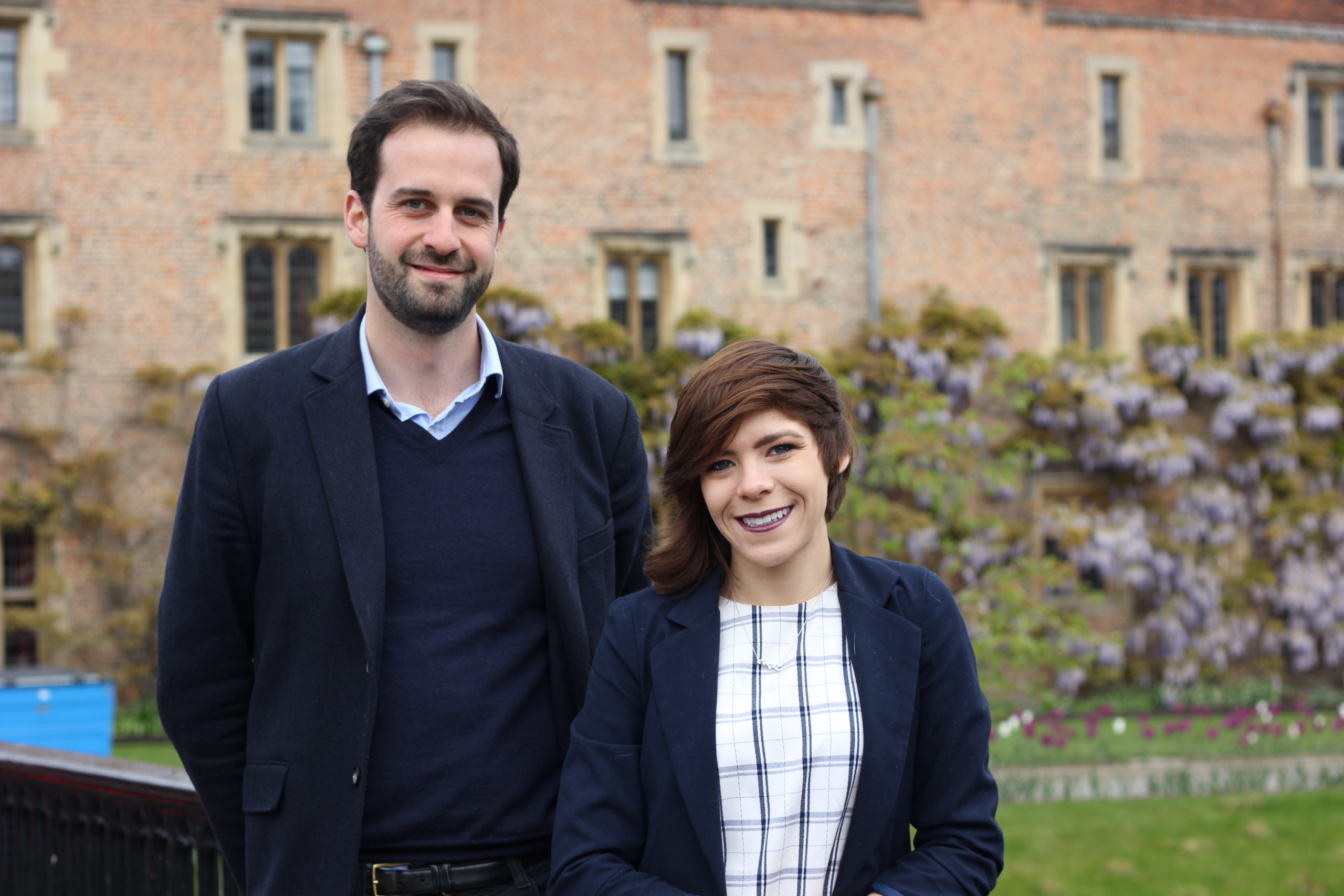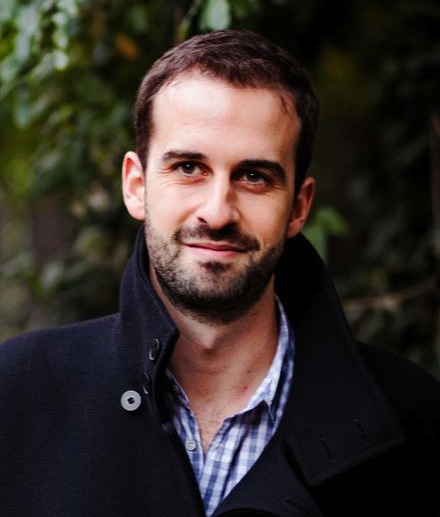
Fabrice Langronet and Victoria Herrmann are sharing the prize after being nominated by their peers.
Two Gates Cambridge Scholars have won the fifth annual Bill Gates Sr. Award for in recognition of their outstanding research and social leadership.
The two Scholars – Fabrice Langronet and Victoria Herrmann – have been awarded the Bill Gates Sr. Award for 2017.
The Award was established by the Gates Cambridge Trustees in June 2012 in recognition of Bill Gates Sr.’s role in establishing the Gates Cambridge Scholarships, over a decade of service as a Trustee, and his engagement with, and inspiration to, many generations of Gates Cambridge Scholars.
The Award allows Scholars to recognise the impact and contribution to the Scholar community of one of their peers (who may be pursuing any subject and be from any part of the world), with particular reference to the Scholarship’s selection criteria.
Scholars were asked to nominate a fellow Scholar for the Award by completing a 500-word statement about why that Scholar would be a suitable recipient. Selection was on the basis of how well the nominated candidates met the selection criteria while in residence in Cambridge. It is the second year running that the award has been shared.
Fabrice [2014], who is doing a PhD in History, was recognised for his innovative research on migration history, which he explores from the vantage point of a tenement unit in the northern suburbs of Paris at the turn of the 20th century. The value of his research is being recognised by his peers in major historical journals and conferences in Europe and America, combining a refined post-structuralist theory, a microhistorical approach and a far-reaching transnational scope. His investigation led him to visit, over the past two years, over fifty archival sites in four countries, and interview more than 60 people in France, Spain, Italy, Scotland and the United States. The value of his research is being recognised by his peers in major historical journals and conferences in Europe and America.
He was also praised for his work on migration issues, with which he first became familiar as a judge specialising in immigration law and as a speechwriter for the President of the French Republic. Fabrice co-founded the Cambridge Migration Society, of which he is President and which allows high-ranking professionals to exchange views with the Cambridge academic community and deepen their understanding of each other's positions and practices. The society has organised several events featuring experts from around the world, including a high-level panel on the Mediterranean refugee crisis and another on Syrian refugees. Fabrice also spoke at the Gates Cambridge Scholar Forum on Migration in Budapest and has written a forthcoming article about the deportation of migrant children in the Human Rights Law Review.
One nominator called him "inspiring, innovative and always upbeat" and added "Fabrice has displayed outstanding human qualities that have quickly made him popular among his fellow Gates scholars".
Victoria [2014], who is doing a PhD in Polar Studies, was nominated for her outstanding work in the field of climate change where she is described as “a fierce advocate creating waves across the field”.
Beyond her PhD work focusing on human development, climate change and adaptation in the Arctic, she is Managing Director at The Arctic Institute where she leads the Institute’s research on climate change and community adaptation in Arctic communities. She is the author of Arctic Melt: Turning Resource Extraction into Human Development (2015) and has been published across many peer-review journals. She was also praised for her public engagement work, including media appearances on the CNN, BBC, NPR, Radio Canada in addition to articles in the Washington Post, Guardian and New York Times, amongst many others.
As a National Geographic Explorer, Victoria spearheaded and led America’s Eroding Edges, a research and storytelling project on the impacts of climate change on coastal communities and livelihoods that will be shared through articles, a book and a documentary.
She has also co-convened the Pocantico Climate & Cultural Heritage Working Group, a working group of high-level cultural heritage leaders engaged in climate change adaptation and migration efforts. In addition, she is Principle Investigator for Micro-grids, Macro-projects & Arctic Renewable Energy, leading on creating a bilateral expert network to research and publish on renewable energy and innovation in the North American Arctic. She has also been an active member of the Gates Cambridge community and was Alumni Officer on the Gates Cambridge Scholars Council.
One of her nominators wrote simply: “Victoria Herrmann is the sort of person on whom – without exaggeration – the world pins its hope.”
Another wrote: “Victoria recognises that climate change is not just, and not even primarily, about rising temperatures and glacial melt. It is about villages destroyed, families forced to move, children going hungry.”
The graduation dinner followed the second annual Gates Cambridge Day of Research [https://www.gatescambridge.org/news/day-research-2017] which saw 12 Scholars give presentations about their research and many others take part in panel discussions and workshops. Subjects covered ranged from how cognitive science can illuminate Brexit to the links between democracy, contemporary forms of imprisonment and the history of the Panama Canal in World War One to how to spread the benefits that some plants derive from a more efficient version of photosynthesis to cereal crops.

Fabrice Langrognet
- Alumni
- France
- 2014 PhD History
- St John's College
Before studying migration history at Cambridge, I served for almost five years as a judge in the administrative branch of the French judiciary. I specialized in immigration and asylum cases, a field I had previously discovered as a volunteer in French NGOs providing help to asylum seekers. In addition, I have also worked as a speechwriter for the President of the French Republic, as a member of the editorial board of an international affairs newsmagazine, and as an adjunct lecturer at Sciences-Po, ENS and other French universities.
After completing my Ph.D. at Cambridge (2019), I joined a Paris research lab called the Centre d'histoire sociale des mondes contemporains (University of Paris 1/CNRS) as an associate researcher. I was then a visiting researcher and Fung global fellow at Princeton University (2020-2021), before joining the University of Oxford in 2021 as a Leverhulme Early Career fellow at the Faculty of History and a William Golding JRF at Brasenose colllege. I am also a fellow at the Institut Convergences Migrations (Paris) and at the Global Public Policy Institute (Berlin).
My publications include a monograph, published in English as Neighbours of Passage: A Microhistory of Migrants in a Paris Tenement, 1882-1932 (Routledge, 2022), and in French as Voisins de passage. Une microhistoire des migrations (La Découverte, 2023).

Victoria Herrmann
- Alumni
- United States
- 2014 PhD Polar Studies at Scott Polar Institute
- Pembroke College
Victoria is interested in exploring the nexus of climate change, human development, and public policy in the Arctic. Her PhD research focuses on how images and aesthetic codes construct values, identities, and ideas of power in the Arctic since the Second World War. From a young age Victoria's grandfather, a Holocaust survivor, has inspired her to pursue a career promoting social justice and empowerment. During her undergraduate degree, she followed that inspiration through two emerging personal interests - art and environmentalism. Through internships at The Smithsonian Institution and the Metropolitan Museum of Art, she helped to create programs to bring different, often contentious, communities together through museum educational events. At the Untied Nations and the Carnegie Endowment for International Peace, she later worked on research, writing, and advocacy for climate justice, urban resiliency in socioeconomically depressed neighbourhoods, and mitigation. Though passionate about art, climate change, and social justice individually, it was not until her Fulbright research that Victoria was able to bring her three disparate interests together. During her year in Canada, she studied how indigenous civil society groups used visual media to empower their voices at climate change negotiations. At Cambridge, she continues this multidisciplinary approach to scholarship by examining the changing visual narratives of geopolitics in the Arctic and its influence on perceptions of power, justice, and agency. As the Alumni Officer Victoria works closely with the Gates Cambridge Alumni Association to connect the scholar and alumni communities.












